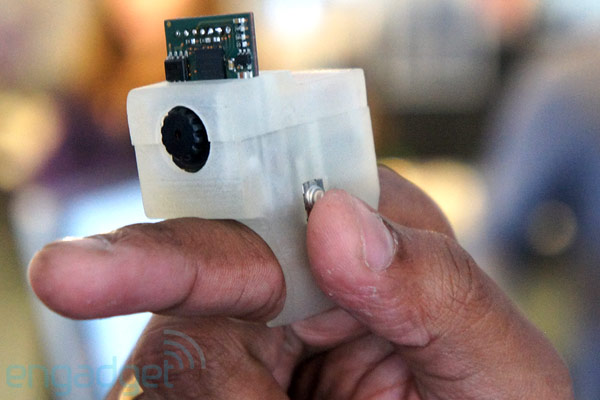| Image source: Engadget |
Suranga Nanayakkara and Roy Shilkrot, researchers at MIT Media Lab, have developed a new bluetooth camera that can be worn on a finger and used to detect objects. This camera has been designed keeping people with visual impairment in mind, and can perform various tasks (based on the “mode” selected) that will not only help perform everyday tasks but also assist in self learning.
The concept of EyeRing is simple – a camera, connected via bluetooth to a phone or similar device that has voice output, is mounted on the user’s finger. The user points the camera at an object and presses the shutter button on the side. The camera takes a picture of the object and sends it to the phone, which detects the object and provides a voice response back to the user.
Picture this: A visually impaired shopper goes to a store. He wears EyeRing on his finger and selects the “distance” mode and points ahead. EyeRing calculates the free space available and speaks out to the shopper. He then starts looking at shirts. He switches to “color” mode and points the camera at the shirts he is looking at. EyeRing detects the color of every shirt and tells the shopper what colors they are. He then switches to “tag” mode, and points EyeRing at the tag of the shirt he selected. EyeRing reads the tag and tells him the price printed on the tag. Finally, to check how much money he has, the shopper pulls out a couple of bills from his wallet and points EyeRing at them. EyeRing reads the denomination on the bills and tells the shopper how much the bills are worth.
Everyday shopping just got so much simpler and easier for visually impaired people!
EyeRing can also be used by little kids who are learning how to read. Instead of someone actually telling them what a word is, they can simply point EyeRing at the word, and using its OCR feature, EyeRing would speak the word back to the kid, thus enabling self learning without anyone else’s assistance.
According to the source link, EyeRing is still buggy, but of course, it is still being worked on, and hopefully in the coming days/months/years would be out in the market and make every day life a lot easier for people with visual impairment.
Watch the following videos to see EyeRing in action. The first video shows how a shopper can use it at a store. The second video is of the researchers talking about EyeRing in more detail.
Source: Engadget, EyeRing website

